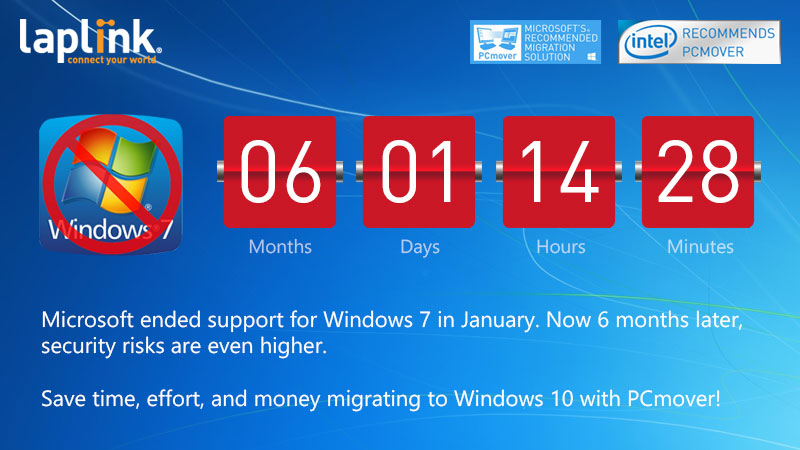Try PCmover
Please note the Evaluation copy of PCmover Enterprise requires you to be logged into a domain when testing. If you would like to test Enterprise without this requirement, please contact corpsales@laplink.com to receive an alternate copy of the software.
Thank you for your interest, and for choosing Laplink Software!
Contact Sales

Counting Patches: A Look Back Since Windows 7 End of Support
January 14, 2020: Windows 7 End of Support
With the events of this year, January seems more like a different lifetime than merely 6 months ago. And while the date may not make history books as a top event of 2020, January 14 marked an important date in the world of technology: the end of extended support for Windows 7.
What was Windows 7 End of Support?
On January 14, 2020, Microsoft officially ended extended support of Windows 7. This discontinued updates and new releases, since the initial end of support was announced on January 13, 2015. Now, the only people that can still receive security updates and patches are paid subscribers of Windows 7 Extended Security Updates (ESU). Those subscribers continued to receive patches as part of Microsoft’s Patch Tuesday, through 2023. However, Microsoft has since released two updates for all users, regardless of if they subscribed to the update program or not.
The first software patch was a mere month after the end of support. Microsoft released a patch to resolve a black wallpaper issue, a problem caused by the last Windows 7 update that was released just before EOS. The second mass-issued update came in June to roll out the new Microsoft Edge browser to PCs that were not connected to Active Directory. Other than those two updates, Windows 7 users who have not subscribed to ESU have been left to their own defenses.
An Opportunity for Hackers
While Microsoft’s two mass updates resolved issues of inconvenience, neither provided protection for users against security breaches or hackers. Hacking groups have taken advantage of this vulnerability. Groups like China’s Winnti hackers, as explained by an article on Naked Security, have found new targets in the months after EOS–many being gaming companies.
“This was a well-resourced effort that used a stolen digital certificate to sign Winnti malware drivers although the use of the Windows x64 Driver Signature Enforcement Overrider (DSEFix) bypass, which doesn’t work on Windows 10, suggests the malware is old and most likely targeted Windows 7 machines,” the article states.
Ongoing Security Concerns
Then in late March, Microsoft disclosed a new Windows 7 code vulnerability that was actively being exploited by hackers and used to target Adobe product users through the Windows Adobe Type Manager Library, a font rendering tool. While the attacks were considered “limited” by Microsoft, the vulnerability allowed for a potential hacker to run code or malware on the attacked device, convincing the user to open a document or window that would then be used to access the machine. Adobe identified the program as exclusive to Microsoft Windows, meaning that not all Adobe users were at risk.
The vulnerability was not only found in Windows 7, but also Windows 10, 8.1, Server 2008, Server 2012, Server 2016, Server 2019, and Server. Versions succeeding Windows 7 were issued updates to resolve the vulnerability, and Windows 7 ESU subscribers received a patch the following month. But, non-subscribers were again left unprotected.
At the end of the day, Microsoft is still singing the same tune from before EOS: upgrade or run the risk. In response to the Adobe attacks, Microsoft issued the following statement:
“For systems running supported versions of Windows 10 a successful attack could only result in code execution within an AppContainer sandbox context with limited privileges and capabilities.”
Simply Put, Windows 10 is Safer
The messaging has remained consistent – Windows 10 is simply better equipped to limit attacks than earlier versions. And when it comes time to upgrade, PCmover is Microsoft’s ONLY recommended PC migration solution, helping you transfer the data that matters to you.
PCmover allows for quick data and profile migrations, from consumers & small home offices, to SMBs, government agencies, and large enterprise organizations.
Why run the risk of a malware attack any longer? Migrate to Windows 10, and let us help you find the solution that best suits your use case!
Windows 7 Migration Kit
Windows 7 Migration Kit – Save up to 50% on PCmover! – Designed to lower the risk of continued Windows 7 use, and ease the transition to Windows 10 for both businesses and home users.
For MSPs, System Integrators, and IT Service professionals looking for a scalable migration solution, PCmover has earned the loyalty and trust of millions of organizations and customers worldwide. Get your free, fully-functional license of PCmover Enterprise here.
Neil Minetto

Neil is the Senior Director of Inside Sales & Marketing at Laplink, bringing deep expertise in pay-per-click advertising, email marketing, lead nurturing, marketing automation, and digital strategy. His career journey includes leadership roles at Indigo Slate, Oracle, and Zones. Neil earned his BA in Communications, Advertising, and Business from BYU. Outside of work, he’s a golf fanatic (which is an understatement) and loves discovering new places with his wife. Whether it's refining marketing strategies or perfecting his golf swing, Neil is always looking for ways to get better.
Read more about Neil Minetto...

Add Comment